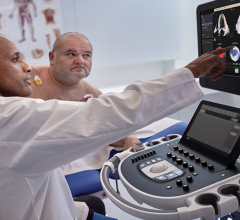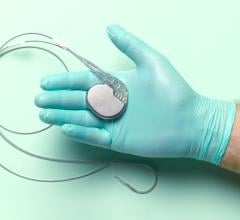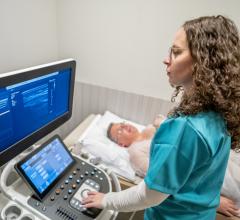
Images from the ASE presentation. Left, UEA echo showing focal narrowing of the SCPC anastomosis and the same view on invasive angiography. Right, UAE echo showing complete occlusion of pulmonary artery and angiography showing the same view.
June 29, 2021 – Echocardiography with ultrasound enhancing agents (UEAs) has proven to be a valuable imaging procedure after surgery for children born with single ventricle congenital heart disease (CHD). This heart defect occurs when one of the two ventricles is not large enough or strong enough to work correctly. Research presented at the American Society of Echocardiography (ASE) 2021 virtual meeting, June 18-21, highlights how echocardiography with UEAs in CHD patients post-operatively can improve diagnostic capabilities and decrease the need for additional testing.
Children with single ventricle CHD require multiple surgeries. The second surgery is typically a superior cavopulmonary connection (SCPC). This surgery increases blood flow to the lungs and makes it easier for the heart to pump blood. If clinical concerns arise after surgery, echocardiography alone can be insufficient for diagnosis and patients often undergo additional testing with exposure to radiation and anesthesia. The Novel Utilization of Ultrasound Enhancing Agents Following Superior Cavopulmonary Connection research study presented at ASE examined the use of UEAs in this pediatric CHD population for the first time.
"Echocardiography with ultrasound enhancing agents can be a valuable tool in the assessment of patients with complex congenital heart disease," Explained lead author Kasey Chaszczewski, M.D., Children's Hospital of Philadelphia. "In a population of patients with single ventricle heart disease, the use of ultrasound enhancing agents produced an ultrasound image comparable to what an X-ray with contrast would typically provide and improved our assessment for post-operative obstruction. As experience with ultrasound enhancing agents grows in the congenital heart disease population, there may be opportunities to decrease invasive and costly procedures, while expediting the care of patients in need of intervention."
For more information: ASEcho.org


 June 12, 2024
June 12, 2024 









